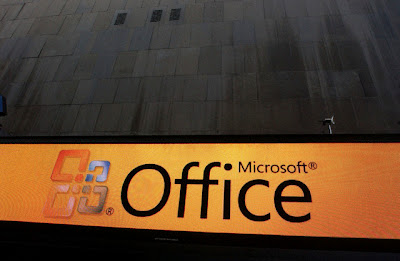Sci-Tech News
All about Apple, iPhone, iPad, Android and other technologies
Tuesday, October 19, 2010
Microsoft Launches New Version of Office for Cloud
SEATTLE (Reuters) – Microsoft launched a fully online version of its popular Office suite of applications on Tuesday as it looks to extend its customer base and beat back rival Google Inc.
The new service, called Office 365, is available as a test from Tuesday in 13 countries, and will be on sale on a subscription basis worldwide next year.
Combining some of Microsoft's existing cloud-based services, it will be available through most browsers, including Mozilla's Firefox, Apple's Inc's Safari and Google's Chrome, and can be used on mobile devices such as Research in Motion Ltd's BlackBerry and Apple's iPad.
That means customers can get access to Office programs like Outlook e-mail, SharePoint websites and simplified versions of Word and Excel without installing software, from virtually anywhere. Customers get access to more features when the software is also installed.
The move strikes a blow against rival Google, which has had some success with its Google Apps service, which provides a low-cost, Web-based alternative to Microsoft's traditional Office software for $50 per user per year.
Microsoft will offer the service to small companies with fewer than 25 employees for $6 or 5.25 euros per user per month.
For larger companies and government organizations, prices will start from $2 per user per month for basic e-mail. A fuller "professional" version will cost up to $27 per user per month.
Office is one of Microsoft's biggest money-earners, alongside its Windows operating system. The unit that makes Office accounted for almost 40 percent of the company's profit last year.
The new service was announced by Kurt DelBene, the new head of the Office business since the beginning of this month. He took over from Stephen Elop, who left to lead phone maker Nokia last month.
Shares of Microsoft were down 3.1 percent at $25.01 on Nasdaq, while Google fell 1.7 percent to $607.14
Monday, October 18, 2010
Facebook applications leaking user information for tracking of companies

Facebook users are inadvertently providing access to their names and in some cases even their friend’s names to advertising and Internet tracking companies, through some popular applications, the Wall Street Journal said.
Pakistan’s second Android Digs Deeper
KARACHI: Pakistan’s second Android offering is here. The arrival of the ‘Ideos’ points to the increasing trend of local carriers offering phones running Google’s free operating system, which may lead other providers to soon follow suit.
Chinese tech giant, Huawei – along with China Mobile’s arm in Pakistan, Zong – is bringing the economical phone to Pakistan, according to a release issued earlier this week.
The Android, a free and open source operating system for mobile phones, has been offering stiff resistance to Apple’s iPhone and Research in Motion’s (Rim) BlackBerry the world over.
Market research firms predict that Android will ‘blow up’ in its competitors’ faces. According to The Nielsen Company, it is now the most popular operating system among people who purchased a smartphone over the past six months, while Rim’s BlackBerry and Apple’s iOS are in a statistical dead heat for second place.
“Android will become the second-largest operating system in 2010 and challenge Nokia’s Symbian for the number one spot by 2014,” claimed technology analysis firm, Gartner, on September 10.
This is remarkable because it reflects how the free operating system, coupled with cheap hardware, is making its way to populous developing countries which have, till very recently, been devoid of the option of purchasing cheaper smartphones.
Officially, the iPhone has still not been introduced in Pakistan and now that the Android is taking off, Google stands to benefit from the first mover advantage.
Most interesting is the fact that phones running Android can be disturbingly cheap. Huawei’s Ideos will cost around Rs16,000 – in stark contrast to iPhones, with a comparable end user experience in terms of the interface, which are available for anywhere between Rs50,000 and Rs99,000.
Huawei says it has worked closely with Google to make the phone which means that upgrades for the device will be quick. The phone is supposed to run the latest version of the Android: 2.2 FroYo.
This version is important because it introduces support for Adobe Flash player plugins which allow native viewing of sites like YouTube on the phone. Flash is not supported by the iPhone and according to industry analysts, this is one of the Android’s main weapons in its war against the iPhone.
Just this Thursday, Google reported that its quarterly profit soared on the back of its thriving internet advertising service and that its display and mobile advertisement businesses are also gaining flight. The Google-backed Android software platform for mobile phones has been a ’phenomenal success’, says the California-based company’s chief executive, Eric Schmidt.
The first android phone to be officially offered in Pakistan by a local mobile carrier was Motorola’s Milestone, more popularly known as the ‘Droid’. The Milestone had been released internationally almost a year earlier but was offered by Mobilink last July for Rs38,000.
Until that time, all Pakistan had to go with from network carriers was the BlackBerry. Now, all this has changed because of Huawei’s Ideos which independent review sites are calling ‘a very good phone given its price’.
Subscribe to:
Posts (Atom)

